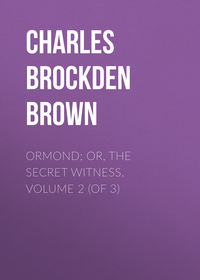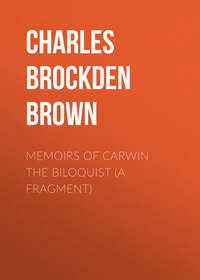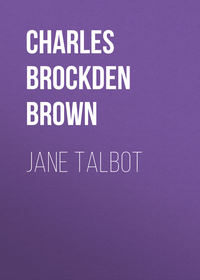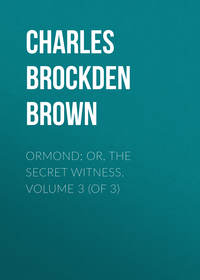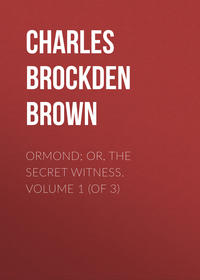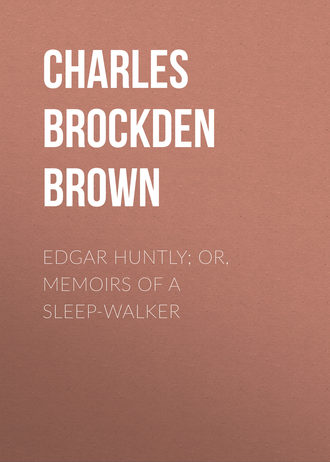 полная версия
полная версияEdgar Huntly; or, Memoirs of a Sleep-Walker
"The greater part of my inquietudes were now removed. You were able to eat and to travel, and there was little doubt that a meeting would take place between us on the next morning. Meanwhile, I determined to concur with those who pursued the remainder of the enemy. I followed you, in the path that you were said to have taken, and quickly joined a numerous party who were searching for those who, on the last night, had attacked a plantation that lies near this, and destroyed the inhabitants.
"I need not dwell upon our doublings and circuities. The enemy was traced to the house of Selby. They had entered, they had put fire on the floor, but were compelled to relinquish their prey. Of what number they consisted could not be ascertained; but one, lingering behind his fellows, was shot, at the entrance of the wood, and on the spot where you chanced to light upon him.
"Selby's house was empty, and before the fire had made any progress we extinguished it. The drunken wretch whom you encountered had probably returned from his nocturnal debauch after we had left the spot.
"The flying enemy was pursued with fresh diligence. They were found, by various tokens, to have crossed the river, and to have ascended the mountain. We trod closely on their heels. When we arrived at the promontory described by you, the fatigues of the night and day rendered me unqualified to proceed. I determined that this should be the bound of my excursions. I was anxious to obtain an interview with you, and, unless I paused here, should not be able to gain Inglefield's as early in the morning as I wished. Two others concurred with me in this resolution, and prepared to return to this house, which had been deserted by its tenants till the danger was past, and which had been selected as the place of rendezvous.
"At this moment, dejected and weary, I approached the ledge which severed the headland from the mountain. I marked the appearance of some one stretched upon the ground where you lay. No domestic animal would wander hither and place himself upon this spot. There was something likewise in the appearance of the object that bespoke it to be man; but, if it were man, it was incontrovertibly a savage and a foe. I determined, therefore, to rouse you by a bullet.
"My decision was perhaps absurd. I ought to have gained more certainty before I hazarded your destruction. Be that as it will, a moment's lingering on your part would have probably been fatal. You started on your feet, and fired. See the hole which your random shot made through my sleeve! This surely was a day destined to be signalized by hairbreadth escapes.
"Your action seemed incontestably to confirm my prognostics. Every one hurried to the spot and was eager to destroy an enemy. No one hesitated to believe that some of the shots aimed at you had reached their mark, and that you had sunk to rise no more.
"The gun which was fired and thrown down was taken and examined. It had been my companion in many a toilsome expedition. It had rescued me and my friends from a thousand deaths. In order to recognise it, I needed only to touch and handle it. I instantly discovered that I held in my hand the fusil which I had left with you on parting, with which your uncle had equipped himself, and which had been ravished from him by a savage. What was I hence to infer respecting the person of the last possessor?
"My inquiries respecting you, of the woman whose milk and bread you had eaten, were minute. You entered, she said, with a hatchet and gun in your hand. While you ate, the gun was laid upon the table. She sat near, and the piece became the object of inquisitive attention. The stock and barrels were described by her in such terms as left no doubt that this was the fusil.
"A comparison of incidents enabled me to trace the manner in which you came into possession of this instrument. One of those whom you found in the cavern was the assassin of your uncle. According to the girl's report, on issuing from your hiding-place you seized a gun that was unoccupied, and this gun chanced to be your own.
"Its two barrels were probably the cause of your success in that unequal contest at Mab's hut. On recovering from _deliquium_, you found it where it had been dropped by you, out of sight and unsuspected by the party that had afterwards arrived. In your passage to the river, had it once more fallen into hostile hands? or had you missed the way, wandered to this promontory, and mistaken a troop of friends for a band of Indian marauders?
"Either supposition was dreadful. The latter was the most plausible. No motives were conceivable by which one of the fugitives could be induced to post himself here, in this conspicuous station; whereas, the road which led you to the summit of the hill, to that spot where descent to the river-road was practicable, could not be found but by those who were accustomed to traverse it. The directions which you had exacted from your hostess proved your previous unacquaintance with these tracts.
"I acquiesced in this opinion with a heavy and desponding heart. Fate had led us into a maze which could only terminate in the destruction of one or of the other. By the breadth of a hair had I escaped death from your hand. The same fortune had not befriended you. After my tedious search, I had lighted on you, forlorn, bewildered, perishing with cold and hunger. Instead of recognising and affording you relief, I compelled you to leap into the river, from a perilous height, and had desisted from my persecution only when I had bereaved you of life and plunged you to the bottom of the gulf.
"My motives in coming to America were numerous and mixed. Among these was the parental affection with which you had inspired me. I came with fortune, and a better gift than fortune, in my hand. I intended to bestow both upon you, not only to give you competence, but one who would endear to you that competence, who would enhance, by participating, every gratification.
"My schemes were now at an end. You were gone, beyond the reach of my benevolence and justice. I had robbed your two sisters of a friend and guardian. It was some consolation to think that it was in my power to stand, with regard to them, in your place; that I could snatch them from the poverty, dependence, and humiliation, to which your death and that of your uncle had reduced them.
"I was now doubly weary of the enterprise in which I was engaged, and returned with speed to this rendezvous. My companions have gone to know the state of the family who resided under this roof, and left me to beguile the tedious moments in whatever manner I pleased.
"I have omitted mentioning one incident that happened between the detection of your flight and our expedition to Chetasco. Having formed a plausible conjecture as to him who walked in the long room, it was obvious to conclude that he who purloined your manuscript, and the walker, was the same personage. It was likewise easily inferred that the letters were secreted in the cedar chest or in some other part of the room. Instances similar to this have heretofore occurred. Men have employed anxious months in search of that which, in a freak of noctambulation, was hidden by their own hands.
"A search was immediately commenced, and your letters were found, carefully concealed between the rafters and shingles of the roof, in a spot where, if suspicion had not been previously excited, they would have remained till the vernal rains and the summer heats had insensibly destroyed them. This packet I carried with me, knowing the value which you set upon it, and there being no receptacle equally safe but your own cabinet, which was locked.
"Having, as I said, reached this house, and being left alone, I bethought me of the treasure I possessed. I was unacquainted with the reasons for which these papers were so precious. They probably had some momentous and intimate connection with your own history. As such, they could not be of little value to me, and this moment of inoccupation and regrets was as suitable as any other to the task of perusing them. I drew them forth, therefore, and laid them on the table in this chamber.
"The rest is known to you. During a momentary absence you entered. Surely no interview of ancient friends ever took place in so unexpected and abrupt a manner. You were dead. I mourned for you, as one whom I loved, and whom fate had snatched forever from my sight. Now, in a blissful hour, you had risen, and my happiness in thus embracing you is tenfold greater than would have been experienced if no uncertainties and perils had protracted our meeting."
Chapter XXVI
Here ended the tale of Sarsefield. Humiliation and joy were mingled in my heart. The events that preceded my awakening in the cave were now luminous and plain. What explication was more obvious? What but this solution ought to have been suggested by the conduct I had witnessed in Clithero?
Clithero? Was not this the man whom Clithero had robbed of his friend? Was not this the lover of Mrs. Lorimer, the object of the persecutions of Wiatte? Was it not now given me to investigate the truth of that stupendous tale? To dissipate the doubts which obstinately clung to my imagination respecting it?
But soft! Had not Sarsefield said that he was married? Was Mrs. Lorimer so speedily forgotten by him, or was the narrative of Clithero the web of imposture or the raving of insanity?
These new ideas banished all personal considerations from my mind. I looked eagerly into the face of my friend, and exclaimed, in a dubious accent, "How say you? Married? When? To whom?"
"Yes, Huntly, I am wedded to the most excellent of women. To her am I indebted for happiness, and wealth, and dignity, and honour. To her do I owe the power of being the benefactor and protector of you and your sisters. She longs to embrace you as a son. To become truly her son will depend upon your own choice, and that of one who was the companion of our voyage."
"Heavens!" cried I, in a transport of exultation and astonishment. "Of whom do you speak? Of the mother of Clarice? The sister of Wiatte? The sister of the ruffian who laid snares for her life? Who pursued you and the unhappy Clithero with the bitterest animosity?"
My friend started at these sounds as if the earth had yawned at his feet. His countenance was equally significant of terror and rage. As soon as he regained the power of utterance, he spoke:–"Clithero! Curses light upon thy lips for having uttered that detested name! Thousands of miles have I flown to shun the hearing of it. Is the madman here? Have you set eyes upon him? Does he yet crawl upon the face of the earth? Unhappy? Unparalleled, unheard-of, thankless miscreant! Has he told his execrable falsehoods here? Has he dared to utter names so sacred as those of Euphemia Lorimer and Clarice?"
"He has; he has told a tale that had all the appearances of truth–"
"Out upon the villain! The truth! Truth would prove him to be unnatural, devilish; a thing for which no language has yet provided a name! He has called himself unhappy? No doubt, a victim to injustice! Overtaken by unmerited calamity. Say! Has he fooled thee with such tales?"
"No. His tale was a catalogue of crimes and miseries of which he was the author and sufferer. You know not his motives, his horrors–"
"His deeds were monstrous and infernal. His motives were sordid and flagitious. To display all their ugliness and infamy was not his province. No; he did not tell you that he stole at midnight to the chamber of his mistress; a woman who astonished the world by her loftiness and magnanimity, by indefatigable beneficence and unswerving equity; who had lavished on this wretch, whom she snatched from the dirt, all the goods of fortune, all the benefits of education; all the treasures of love; every provocation to gratitude; every stimulant to justice.
"He did not tell you that, in recompense for every benefit, he stole upon her sleep and aimed a dagger at her breast. There was no room for flight, or ambiguity, or prevarication. She whom he meant to murder stood near, saw the lifted weapon, and heard him confess and glory in his purposes.
"No wonder that the shock bereft her, for a time, of life. The interval was seized by the ruffian to effect his escape. The rebukes of justice were shunned by a wretch conscious of his inexpiable guilt. These things he has hidden from you, and has supplied their place by a tale specious as false."
"No. Among the number of his crimes, hypocrisy is not to be numbered. These things are already known to me: he spared himself too little in the narrative. The excellencies of his lady, her claims to gratitude and veneration, were urged beyond their true bounds. His attempts upon her life were related. It is true that he desired and endeavoured to destroy her."
"How? Has he told you this?"
"He has told me all. Alas! the criminal intention has been amply expiated."
"What mean you? Whence and how came he hither? Where is he now? I will not occupy the same land, the same world, with him. Have this woman and her daughter lighted on the shore haunted by this infernal and implacable enemy?"
"Alas! It is doubtful whether he exists. If he lives, he is no longer to be feared; but he lives not. Famine and remorse have utterly consumed him."
"Famine? Remorse? You talk in riddles."
"He has immured himself in the desert. He has abjured the intercourse of mankind. He has shut himself in caverns where famine must inevitably expedite that death for which he longs as the only solace of his woes. To no imagination are his offences blacker and more odious than to his own. I had hopes of rescuing him from this fate, but my own infirmities and errors have afforded me sufficient occupation."
Sarsefield renewed his imprecations on the memory of that unfortunate man, and his inquiries as to the circumstances that led him into this remote district. His inquiries were not to be answered by one in my present condition. My languors and fatigues had now gained a pitch that was insupportable. The wound in my face had been chafed and inflamed by the cold water and the bleak air; and the pain attending it would no longer suffer my attention to stray. I sunk upon the floor, and entreated him to afford me the respite of a few hours' repose.
He was sensible of the deplorableness of my condition, and chid himself for the negligence of which he had already been guilty. He lifted me to the bed, and deliberated on the mode he should pursue for my relief. Some mollifying application to my wound was immediately necessary; but, in our present lonely condition, it was not at hand. It could only be procured from a distance. It was proper therefore to hasten to the nearest inhabited dwelling, which belonged to one by name Walton, and supply himself with such medicines as could be found.
Meanwhile, there was no danger of molestation and intrusion. There was reason to expect the speedy return of those who had gone in pursuit of the savages. This was their place of rendezvous, and hither they appointed to reassemble before the morrow's dawn. The distance of the neighbouring farm was small, and Sarsefield promised to be expeditious. He left me to myself and my own ruminations.
Harassed by fatigue and pain, I had yet power to ruminate on that series of unparalleled events that had lately happened. I wept, but my tears flowed from a double source: from sorrow, on account of the untimely fate of my uncle, and from joy, that my sisters were preserved, that Sarsefield had returned and was not unhappy.
I reflected on the untoward destiny of Clithero. Part of his calamity consisted in the consciousness of having killed his patroness; but it now appeared, though by some infatuation I had not previously suspected, that the first impulse of sorrow in the lady had been weakened by reflection and by time; that the prejudice persuading her that her life and that of her brother were to endure and to terminate together was conquered by experience or by argument. She had come, in company with Sarsefield and Clarice, to America. What influence might these events have upon the gloomy meditations of Clithero? Was it possible to bring them together; to win the maniac from his solitude, wrest from him his fatal purposes, and restore him to communion with the beings whose imagined indignation is the torment of his life?
These musings were interrupted by a sound from below, which was easily interpreted into tokens of the return of those with whom Sarsefield had parted at the promontory. Voices were confused and busy, but not turbulent. They entered the lower room, and the motion of chairs and tables showed that they were preparing to rest themselves after their toils.
Few of them were unacquainted with me, since they probably were residents in this district. No inconvenience, therefore, would follow from an interview, though, on their part, wholly unexpected. Besides, Sarsefield would speedily return, and none of the present visitants would be likely to withdraw to this apartment.
Meanwhile, I lay upon the bed, with my face turned towards the door, and languidly gazing at the ceiling and Walls. Just then a musket was discharged in the room below. The shock affected me mechanically, and the first impulse of surprise made me almost start upon my feet.
The sound was followed by confusion and bustle. Some rushed forth and called on each other to run different ways, and the words, "That is he,"–"Stop him!" were spoken in a tone of eagerness and rage. My weakness and pain were for a moment forgotten, and my whole attention was bent to discover the meaning of this hubbub. The musket which I had brought with me to this chamber lay across the bed. Unknowing of the consequences of this affray with regard to myself, I was prompted, by a kind of self-preserving instinct, to lay hold of the gun and prepare to repel any attack that might be made upon me.
A few moments elapsed, when I thought I heard light footsteps in the entry leading to this room. I had no time to construe these signals, but, watching fearfully the entrance, I grasped my weapon with new force, and raised it so as to be ready at the moment of my danger. I did not watch long. A figure cautiously thrust itself forward. The first glance was sufficient to inform me that this intruder was an Indian, and, of consequence, an enemy. He was unarmed. Looking eagerly on all sides, he at last spied me as I lay. My appearance threw him into consternation, and, after the fluctuation of an instant, he darted to the window, threw up the sash, and leaped out upon the ground.
His flight might have been easily arrested by my shot, but surprise, added to my habitual antipathy to bloodshed unless in cases of absolute necessity, made me hesitate. He was gone, and I was left to mark the progress of the drama. The silence was presently broken by firing at a distance. Three shots, in quick succession, were followed by the deepest pause.
That the party, recently arrived, had brought with them one or more captives, and that by some sudden effort the prisoners had attempted to escape, was the only supposition that I could form. By wrhat motives either of them could be induced to seek concealment in my chamber could not be imagined.
I now heard a single step on the threshold below. Some one entered the common room. He traversed the floor during a few minutes, and then, ascending the staircase, he entered my chamber. It was Sarsefield. Trouble and dismay were strongly written on his countenance. He seemed totally unconscious of my presence; his eyes were fixed upon the floor, and, as he continued to move across the room, he heaved forth deep sighs.
This deportment was mournful and mysterious. It was little in unison with those appearances which he wore at our parting, and must have been suggested by some event that had since happened. My curiosity impelled me to recall him from his reverie. I rose, and, seizing him by the arm, looked at him with an air of inquisitive anxiety. It was needless to speak.
He noticed my movement, and, turning towards me, spoke in a tone of some resentment:–"Why did you deceive me? Did you not say Clithero was dead?"
"I said so because it was my belief. Know you any thing to the contrary? Heaven grant that he is still alive, and that our mutual efforts may restore him to peace!"
"Heaven grant," replied my friend, with a vehemence that bordered upon fury,–"Heaven grant that he may live thousands of years, and know not, in their long course, a moment's respite from remorse and from anguish! But this prayer is fruitless. He is not dead, but death hovers over him. Should he live, he will live only to defy justice and perpetrate new horrors. My skill might perhaps save him, but a finger shall not be moved to avert his fate.
"Little did I think that the wretch whom my friends rescued from the power of the savages, and brought wounded and expiring hither, was Clithero. They sent for me in haste to afford him surgical assistance. I found him stretched upon the floor below, deserted, helpless, and bleeding. The moment I beheld him, he was recognised. The last of evils was to look upon the face of this assassin; but that evil is past, and shall never be endured again.
"Rise, and come with me. Accommodation is prepared for you at Walcot's. Let us leave this house, and, the moment you are able to perform a journey, abandon forever this district."
I could not readily consent to this proposal. Clithero had been delivered from captivity, but was dying for want of that aid which Sarsefield was able to afford. Was it not inhuman to desert him in this extremity? What offence had he committed that deserved such implacable vengeance? Nothing I had heard from Sarsefield was in contradiction to his own story. His deed, imperfectly observed, would appear to be atrocious and detestable; but the view of all its antecedent and accompanying events and motives would surely place it in the list, not of crimes, but of misfortunes.
But wrhat is that guilt which no penitence can expiate? Had not Clithero's remorse been more than adequate to crimes far more deadly and enormous than this? This, however, was no time to argue with the passions of Sarsefield. Nothing but a repetition of Clithero's tale could vanquish his prepossessions and mollify his rage; but this repetition was impossible to be given by me, till a moment of safety and composure.
These thoughts made me linger, but hindered me from attempting to change the determination of my friend. He renewed his importunities for me to fly with him. He dragged me by the arm, and, wavering and reluctant, I followed where he chose to lead. He crossed the common room, with hurried steps, and eyes averted from a figure which instantly fastened my attention.
It was indeed Clithero whom I now beheld, supine, polluted with blood, his eyes closed, and apparently insensible. This object was gazed at with emotions that rooted me to the spot. Sarsefield, perceiving me determined to remain where I was, rushed out of the house, and disappeared.
Chapter XXVII
I hung over the unhappy wretch, whose emaciated form and rueful features sufficiently bespoke that savage hands had only completed that destruction which his miseries had begun. He was mangled by the tomahawk in a shocking manner, and there was little hope that human skill could save his life.
I was sensible of nothing but compassion. I acted without design, when, seating myself on the floor, I raised his head and placed it on my knees. This movement awakened his attention, and, opening his eyes, he fixed them on my countenance. They testified neither insensibility, nor horror, nor distraction. A faint emotion of surprise gave way to an appearance of tranquillity. Having perceived these tokens of a state less hopeless than I at first imagined, I spoke to him:–"My friend, how do you feel? Can any thing be done for you?"
He answered me in a tone more firm and with more coherence of ideas than previous appearances had taught me to expect. "No," said he; "thy kindness, good youth, can avail me nothing. The end of my existence here is at hand. May my guilt be expiated by the miseries that I have suffered, and my good deeds only attend me to the presence of my divine Judge!
"I am waiting, not with trembling or dismay, for this close of my sorrows. I breathed but one prayer, and that prayer has been answered. I asked for an interview with thee, young man; but, feeling as I now feel, this interview, so much desired, was beyond my hope. Now thou art come, in due season, to hear the last words that I shall need to utter.


